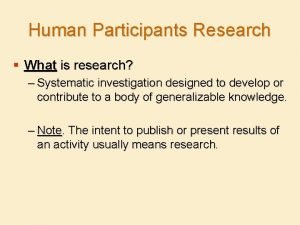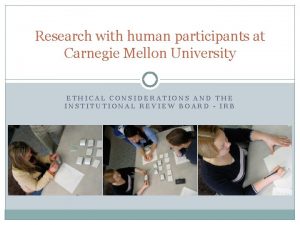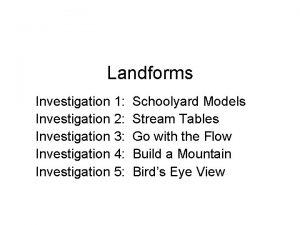Human Participants Research What is research Systematic investigation











- Slides: 11

Human Participants Research § What is research? – Systematic investigation designed to develop or contribute to a body of generalizable knowledge. – Note. The intent to publish or present results of an activity usually means research.

Human Participants Research § Who is a research participant? – living individual about whom a researcher obtains either § data through direct intervention or interaction with the individual – EXAMPLES: surveys, interviews, observation, taking medical histories, obtaining blood samples, § identifiable private information (obtained indirectly – third party)

Human Participants Research § When does research require the inclusion of human participant protections? – when human beings are asked to participate physically in an activity (i. e. in a survey, answering a questionnaire) or to donate their tissue, organs, fluids and other bodily materials it is considered human subject involvement.

Human Participants Research § Why is it important to protect human research participants? – promote the safety and well being of human participants in research – adhere to the ethical values and principles underlying research – implement ethical and scientifically valid research, and – allay concerns by the general public about the responsible conduct of research.

Primary Ethical Guidelines § Respect for persons – Voluntarily participation, freedom from coercion – Extra care must be taken with vulnerable populations (elderly, children, prisoners, people who have learning disabilities or who are mentally ill) – Informed consent § Beneficence – Maximize benefits, minimize risks or costs. – Protect privacy of participants and ensure confidentiality of data § Justice – Selection of subjects should not be based on class, SES, or race unless the study objectives require such selectivity – Present alternative

Human Participants Research § How do I get approval for my research? – Submit a human subjects form to the Office for Faculty Research. – Form is reviewed by Chair and Director of Faculty Research, and if necessary, by all members of the Institutional Review Board (IRB).

Type of Review § Exempt – Misnomer because research is NOT “exempt” from approval and from using a consent form. § 6 categories 1. Research conducted in commonly accepted educational settings, involving normal educational practices (e. g. , instructional techniques, classroom management) 2. Educational tests, surveys, interviews, or observation of public behavior (unless recorded in such a way that the human participant could be identified and placed at risk) 3. Educational tests, surveys, interviews, or observation of public behavior (except if individuals are public officials or candidates)

Type of Review § Exempt (continued) 4. The collection or study of existing data, documents, records, specimens, if the data are publicly available and recorded so participants are not identifiable. 5. Research conducted by an official agency or department heads on public benefit or service programs. 6. Taste and food quality evaluation and consumer acceptance studies of wholesome foods containing an ingredient identified as safe by the FDA.

Type of Review § Expedited 1. Projects involving minimal risk as identified by the Federal Government (i. e. , odds of harm are not greater than one might expect in daily life) – 8 categories (e. g. , collection of audio or visual data, research employing surveys, interviews, focus groups, program evaluation) 2. Projects involving minor changes in previously approved research.

Type of Review § Full Board (once a month) – Usually the 2 nd Tuesday – All other research – Must be approved by majority of the IRB members.

Filling out the IRB Protocol § Two Forms – check website § Important Points: – Dates of research – Nature/purpose of research – Description of participants and research methodology. § Do not merely attach your grant proposal, research paper. – Explanation of benefits/risks to individual, society, and/or science. – Informed consent § See sample – Signatures § PI, Department Chair, Dean, IRB Chair
 Systematic investigation example
Systematic investigation example A systematic investigation
A systematic investigation Example of participants section in research paper
Example of participants section in research paper Cmu citi training
Cmu citi training Systematic study of human society
Systematic study of human society Vce chemistry practical investigation
Vce chemistry practical investigation Jenis jenis investigasi
Jenis jenis investigasi Is holistic qualitative or quantitative
Is holistic qualitative or quantitative Systematic approach to research
Systematic approach to research Systematic review research proposal
Systematic review research proposal Marketing research is the systematic design ____ of data
Marketing research is the systematic design ____ of data Zimmerman telegram
Zimmerman telegram





















